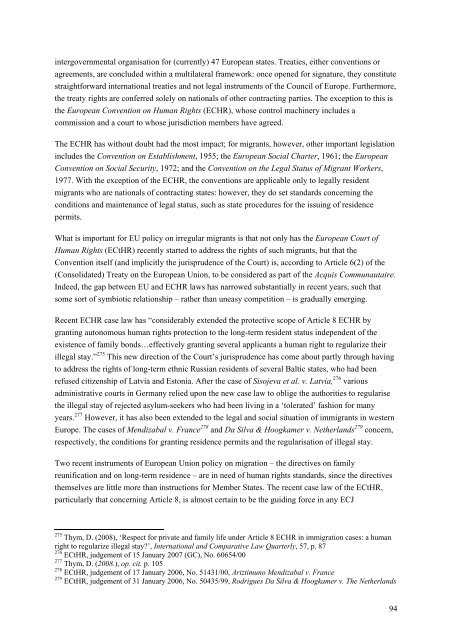REGINE Regularisations in Europe Final Report - European ...
REGINE Regularisations in Europe Final Report - European ...
REGINE Regularisations in Europe Final Report - European ...
Create successful ePaper yourself
Turn your PDF publications into a flip-book with our unique Google optimized e-Paper software.
<strong>in</strong>tergovernmental organisation for (currently) 47 <strong>Europe</strong>an states. Treaties, either conventions or<br />
agreements, are concluded with<strong>in</strong> a multilateral framework: once opened for signature, they constitute<br />
straightforward <strong>in</strong>ternational treaties and not legal <strong>in</strong>struments of the Council of <strong>Europe</strong>. Furthermore,<br />
the treaty rights are conferred solely on nationals of other contract<strong>in</strong>g parties. The exception to this is<br />
the <strong>Europe</strong>an Convention on Human Rights (ECHR), whose control mach<strong>in</strong>ery <strong>in</strong>cludes a<br />
commission and a court to whose jurisdiction members have agreed.<br />
The ECHR has without doubt had the most impact; for migrants, however, other important legislation<br />
<strong>in</strong>cludes the Convention on Establishment, 1955; the <strong>Europe</strong>an Social Charter, 1961; the <strong>Europe</strong>an<br />
Convention on Social Security, 1972; and the Convention on the Legal Status of Migrant Workers,<br />
1977. With the exception of the ECHR, the conventions are applicable only to legally resident<br />
migrants who are nationals of contract<strong>in</strong>g states: however, they do set standards concern<strong>in</strong>g the<br />
conditions and ma<strong>in</strong>tenance of legal status, such as state procedures for the issu<strong>in</strong>g of residence<br />
permits.<br />
What is important for EU policy on irregular migrants is that not only has the <strong>Europe</strong>an Court of<br />
Human Rights (ECtHR) recently started to address the rights of such migrants, but that the<br />
Convention itself (and implicitly the jurisprudence of the Court) is, accord<strong>in</strong>g to Article 6(2) of the<br />
(Consolidated) Treaty on the <strong>Europe</strong>an Union, to be considered as part of the Acquis Communautaire.<br />
Indeed, the gap between EU and ECHR laws has narrowed substantially <strong>in</strong> recent years, such that<br />
some sort of symbiotic relationship – rather than uneasy competition – is gradually emerg<strong>in</strong>g.<br />
Recent ECHR case law has “considerably extended the protective scope of Article 8 ECHR by<br />
grant<strong>in</strong>g autonomous human rights protection to the long-term resident status <strong>in</strong>dependent of the<br />
existence of family bonds…effectively grant<strong>in</strong>g several applicants a human right to regularize their<br />
illegal stay.” 275 This new direction of the Court’s jurisprudence has come about partly through hav<strong>in</strong>g<br />
to address the rights of long-term ethnic Russian residents of several Baltic states, who had been<br />
refused citizenship of Latvia and Estonia. After the case of Sisojeva et al. v. Latvia, 276 various<br />
adm<strong>in</strong>istrative courts <strong>in</strong> Germany relied upon the new case law to oblige the authorities to regularise<br />
the illegal stay of rejected asylum-seekers who had been liv<strong>in</strong>g <strong>in</strong> a ‘tolerated’ fashion for many<br />
years. 277 However, it has also been extended to the legal and social situation of immigrants <strong>in</strong> western<br />
<strong>Europe</strong>. The cases of Mendizabal v. France 278 and Da Silva & Hoogkamer v. Netherlands 279 concern,<br />
respectively, the conditions for grant<strong>in</strong>g residence permits and the regularisation of illegal stay.<br />
Two recent <strong>in</strong>struments of <strong>Europe</strong>an Union policy on migration – the directives on family<br />
reunification and on long-term residence – are <strong>in</strong> need of human rights standards, s<strong>in</strong>ce the directives<br />
themselves are little more than <strong>in</strong>structions for Member States. The recent case law of the ECtHR,<br />
particularly that concern<strong>in</strong>g Article 8, is almost certa<strong>in</strong> to be the guid<strong>in</strong>g force <strong>in</strong> any ECJ<br />
275 Thym, D. (2008), ‘Respect for private and family life under Article 8 ECHR <strong>in</strong> immigration cases: a human<br />
right to regularize illegal stay?’, International and Comparative Law Quarterly, 57, p. 87<br />
276 ECtHR, judgement of 15 January 2007 (GC), No. 60654/00<br />
277 Thym, D. (2008.), op. cit. p. 105<br />
278 ECtHR, judgement of 17 January 2006, No. 51431/00, Ariztimuno Mendizabal v. France<br />
279 ECtHR, judgement of 31 January 2006, No. 50435/99, Rodrigues Da Silva & Hoogkamer v. The Netherlands<br />
94
















